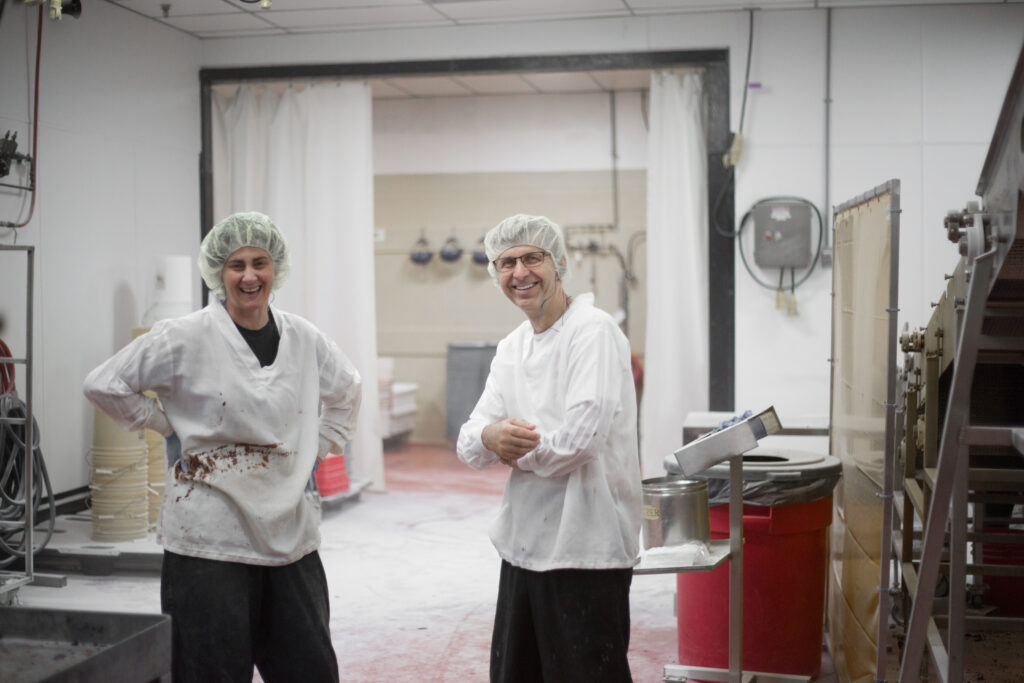Second Chance Employer Profile
Rhino Foods

Burlington, Vt.-headquartered Rhino Foods may go down in culinary history for its contribution to the creation of chocolate chip cookie dough ice cream. But it’s also known for its inclusive hiring practices.
The family-owned company began as a frozen custard shop called Chessy’s in the early 80s. Founders Ted and Anne Castle worked with Ben & Jerry’s to create the first chocolate chip cookie dough ice cream. And Rhino Foods today supplies 60% to 70% of all cookie dough inclusions used by U.S. ice cream makers. It also produces baked brownie and cake pieces and sells them to ice cream manufacturers.
Rhino Foods has 200 to 230 employees, depending on the time of the year. They work in three shifts – two production shifts and a shift for sanitation, an essential procedure in a food production business. .
Second chance hiring practices
To obtain employment at Rhino Foods, a person fills out a form online that lets the company know what position they’re interested in and what shift they’d like to work.
There are no interviews and no background checks for manufacturing production staff job candidates.
“For operations, (the manufacturing shift work) which makes up about 70 to 80 percent of our workforce, the jobs are fully inclusive. In order to be truly inclusive, we don’t want to feel that people have to disclose if they don’t want to,” says Rooney Castle, company’s current president and CEO and the son of the founders. “We think that as soon as you get data you add in bias or stigma, even if you don’t want to.”
As far as qualifications, “All we ask for is three things. You have to show up on time. You have to be ready and willing to learn. And you have to treat people with respect,” he says.
The one requirement is a POPE (post-offer, pre-employment) physical exam to make sure people can physically handle a job that requires twisting their bodies, lifting and cutting bags.
Employees are found through a variety of sources, including Working Fields and Vermont Works for Women.
Another source of employees at various times has been the women released from the Chittenden Regional Correctional Facility. “Down the road there’s a women’s correctional facility. We’ve gone in and talked to folks who are soon to be released about Rhino. We’ve had people who have come out of there and worked at Rhino and gone back in to talk to women who are still incarcerated.”
All new hires participate in what the company calls its Crash Course, after a group of rhinos which is known as a crash. The two-day program trains new employees on the floor on the job and in the classroom and includes cohorts of from two to 10 new employees. The training focuses on personal safety, food safety and job skills.
For the past 15 years Rhino Foods has had a position called a resource coordinator, who is employed by United Way but works onsite for 20 to 30 hours per week. Her job is to connect employees with the resources they need, whether it’s paying heating bills, finding childcare or figuring out the best way to get a GED. Rhino pays United Way for her services.
Another way the company helps its employees is by offering a program called Income Advance through its Rhino Foods Foundation. Any employee in good standing who has been working at Rhino for a month qualifies for an up to $1,500, no questions asked, on-the-spot loan. The loan is through a local credit union. The loan is paid back through weekly $50 payroll deductions. And after it’s paid off, the payments continue and go into a savings account. That way people can build up credit and create savings through the same process. Rhino is a B Corp and has partnered with B Lab, B Corp’s nonprofit network, to take its Income Advance program national.
Although it has been hiring people with barriers to employment for many years, the company still faces challenges, according to Castle.
“One of the big challenges is when you open yourself up to a population that’s coming in that requires more support, whether it’s people who were formerly incarcerated, in recovery or unhoused,” Castle says. “Unless the frontline managers buy into it they’re going to fight it. We need to figure out how we can support our managers to support the people coming in, because they’re going to blame inclusive hiring on any problems. The worst thing we can do is put this initiative in place and just let it happen. We have to support it and make it work.”
In spite of the challenges, there are many rewards.
“When it works it’s incredible. The individual stories are amazing. There’s the loyalty and appreciation that people feel because they were given an opportunity at Rhino that they wouldn’t achieve somewhere else,” Castle says. “Seeing people who want to succeed but have a lot against them, and to help them get through some of those things is awesome.”
And for those thinking of starting a second chance hiring initiative at their company, Castle has some advice. “Talk to others who have done it. You don’t need to reinvent the wheel,” he says. “And try it. If you try to wait for the perfect program, you’ll never press go. Figure out ways to get employee feedback. Elevating employee voice is super important. When you get feedback be willing to try something new. It’s going to be a learning journey.”
